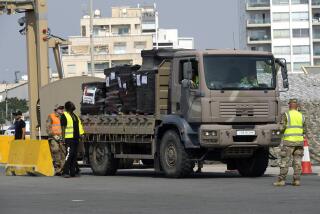Bosnia Truckers Take Over Where U.N. Leaves Off
- Share via
SARAJEVO, Bosnia-Herzegovina — Muhamed Gucanovic, a 45-year-old trucker, opted not to tell his wife where he was headed at 4 a.m. Wednesday. “It is better she doesn’t know,” he said with a wink.
That’s because he was one of five Sarajevans who accepted the United Nations’ offer to defy Bosnian Serb threats and drive a convoy of flour, powdered milk and canned vegetables from the Sarajevo airport into the capital’s barren relief warehouses--via the deadly Dobrinja suburb.
For protection, he borrowed the flak jacket of a French peacekeeper, yanked out its bulletproof Kevlar protective shielding and wedged it between two pieces of plywood. He then strapped the improvised guard to his left window, exposed to Bosnian Serb fire on the way to the airport, rotating it to the right side as he exited.
Thirty-eight months into its mission, this is what the United Nations has been reduced to in Bosnia--creeping around under cover of darkness, issuing coded instructions on walkie-talkies to muddle potential foes and generally banking on debilitating late-night encounters by Bosnian Serbs with slivovitz (a plum brandy)--all in a vain attempt to keep cupboards stocked in this besieged capital.
“We take the crumbs we are thrown,” said Karen abu Zayd, who runs the Office of the U.N. High Commissioner for Refugees’ multimillion-dollar mission in Bosnia.
On paper, the unprecedented, semi-covert five-day operation, which concluded Wednesday night, succeeded. The drivers not only stood up to the Bosnian Serbs and survived without incident, but they also delivered 250 tons of relief into a city in need.
But in an illustration of the limits to U.N. defiance, the international organization’s refugee agency has run out of options. The longest-running airlift in history, which brought in food and aid, is suffering from its longest-ever stall. Road convoys into the capital have been halted since Bosnian Serbs began rounding up U.N. hostages two weeks ago.
The difference between 1995 and 1992, when the war began, however, is Bosnian self-sufficiency. Though the U.N. refugee agency will soon exhaust its stocks, Sarajevo authorities have stockpiled three months or so worth of supplies--by using commercial routes into the city, which the Bosnian Serbs closed in March, and by exploiting a mile-long tunnel that links Bosnian government-controlled central Bosnia with the capital, which is surrounded by Bosnian Serbs.
Still, Sarajevans make every effort to play up the extent of the food crisis in hopes that the conscience-stricken West’s concern about starving civilians--combined with rage at the detention of peacekeepers, the downing of a U.S. jet and the shelling of U.N. “safe areas”--might prompt the world body to seize and control a treacherous route into Sarajevo that wraps around nearby Mt. Igman.
U.N. officials say that after one Sarajevo bakery runs out of refugee agency-supplied flour in another week, government stocks will be quickly tapped.
To the satisfaction of Sarajevans, though, the U.N. refugee officials and military commanders in Bosnia have recommended that “Task Force Alpha,” a 1,500-troop unit training in central Bosnia, deploy along the winding, 11-mile Mt. Igman road.
“There is no other option, there is no life here without that road,” said Rizo Karabek, 63, an oven operator who has worked in the huge bakery here since 1949.
Until a more permanent means to supply the capital can be found, the U.N. refugee agency this week decided to hand over 4,200 tons of relief earmarked for Sarajevo to Bosnian officials outside the capital: It will be up to them to decide how to smuggle it in.
More to Read
Sign up for Essential California
The most important California stories and recommendations in your inbox every morning.
You may occasionally receive promotional content from the Los Angeles Times.













